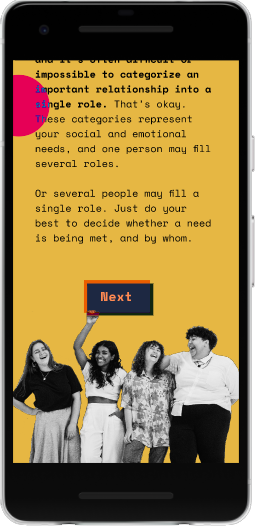Reliance: Combating loneliness with a tool to grow and organize a variety of relationships
My Roles: End to end research and design, including: user research, ideation, expert collaboration, wireframing, low and high-fidelity prototyping, usability studies, iterating on designs
Introduction
Loneliness is a health crisis that affects millions of people. It has been shown to increase mortality more than obesity, and living with loneliness is comparable to the risks of smoking.
Reliance is both a mobile app and responsive website that helps users fight loneliness by:
Educating users about their social needs and different kinds of relationships
Guiding users in organizing their current relationships to determine if their social needs are being met
Helping users make and work towards social goals to increase the health of their social circle
Duration: September 2021 - October 2021
The Problem: Loneliness is a serious problem among American adults, with 36% of all adults, and a majority of young adults and mothers with young children reporting “serious loneliness”. This is due to a number of factors, but not having sufficient social and emotional support is a major contributor.
The Goal: To create an app that organizes a user’s existing relationships and offers structured goals to add and improve specific types of relationships that offer different important social and emotional benefits.
User research
User Research Summary: I conducted interviews and created user personas in order to identify where users felt that their relationships were not meeting their emotional needs. This included not being able to articulate what kinds of relationships they had, except for their primary partner, and not structuring their life around their important, joyful relationships.
Before conducting this research, I didn’t know what specific issues people had that caused them to experience loneliness. I also talked to two therapists who mentioned that friendships were often treated as incidental and not very important, which causes feelings of disconnection, depression, and loneliness.
Pain points:
Unknown emotional needs: Most users that I spoke with did not know or understand their social needs, and that addressing them could help with loneliness and depression.
Dating apps: Most technology support is for dating--i.e., finding your primary partner. This sends the message that the only relationship of consequence is your primary partner.
Lack of time for friendships: Several users reported that because friendship had a lower priority in their life than work or their immediate family obligations, they simply did not have enough time to nurture meaningful connections.
Social skill struggles: Some users understood the importance of friendships and would even have the time, but lacked the confidence in their social skills to create meaningful connections in their life.
Problem Statement: Inez is a single mother who needs a way to build a social network of friends and supporters because she does not want to become depressed in her new town.
Starting the design
Paper wireframes: I used this stage to list all of the features I wanted to include in the app, as well as quickly draw some version of what I wanted it to look like. I used the exercise “Crazy 8s” to draw a number of possible features, including connections between friends and using different sized circles to represent varying relationship importance.
Digital Wireframes: Reliance is an app with an accompanying responsive website. The purpose of the app is to be a convenient way of inputting your relationships, and as a convenient tool for reminding the user of their daily and weekly goals.
The purpose of the website is education, guiding the user toward the app, and viewing relationships and goals on a larger device.
Low-fidelity prototype: TheThe low-fidelity app prototype allows the user to simulate adding relationships to their circle, and describing their quality and significance.
The responsive website prototypes allow the user to sign in and explore their understanding of relationship archetypes.
View the Reliance app low-fidelity prototype.
Usability studies: conducted two rounds of usability studies. During the first round, I learned that users performed better with a step-by-step onboarding to the tools that Reliance offers. In the second round of testing, I learned that the onboarding was too long and that I needed to trim the experience or offer a way for the user to return and finish it later.
Round 1 findings:
Users didn’t know where to begin when going through the app
Users didn’t know what each of the relationships meant
Users didn’t understand the purpose of the app
Round 2 findings:
Users felt that onboarding took too long
Users wanted more information about the psychology behind the app
Users wanted a feature that allows them to find new relationships
Refining the Design
Mockups: Because several users mentioned that they didn’t know how long onboarding would be, I included dotted circles to indicate the number of relationships that still needed to be filled in.
I learned from the second usability study that users wanted more insights into their relationships and habits, not just actionable goals. They wanted to know what to keep doing as well as what to change in their habits.
High-Fidelity Prototype: he high-fidelity prototype includes several screens of the onboarding, as well as a mockup of the insights screen. This app continues to be a work in progress with hopes of creating a useful tool that can be used by real people.
View the completed Reliance app high-fidelity prototype. Most of the functionality is prototyped, so feel free to click around!
Accessibility Considerations:
One of the main fixes that are planned for the app is the color scheme. It is currently not accessible to all people with color vision differences, and I plan to go through with an accessibility checker and test each color combination and make appropriate changes.
Relationships do not have photos, and users are encouraged to use nicknames. Users who are in abusive relationships, who might be able to use this app to form the connections they need to leave, may not feel it is safe to have pictures or names of people on their phone. Further attention will be given to this use case.
Thinking about users with social skill differences, I would like to design a feature that gives neurodiverse-informed instruction on forming connections with each archetype.
Responsive Design
Sitemap: With the app completed, I began work on the responsive website. I used this site map to guide my work and ensure that the website included everything the user would need to accomplish their goals; namely, to learn more about the relationship archetypes and to explore their relationships.
Responsive design: I included design variations for three sizes: desktop, tablet, and mobile. The designs fit the specific needs of users for each of the three screen sizes.
Going Forward
Impact: This app aims to address the problem of loneliness in America by giving users a tool for understanding their relationships and their importance in their lives.
A quote from user testing: “I didn’t know that all of these kinds of relationships were important. I just sort of called everyone a ‘friend’. I think this is going to be really useful.”
What I learned: In creating this app, I learned that users have limited patience for onboarding, and that it’s important to give them a way to save onboarding for later. I also learned that it’s important to give them a goal and clear, discrete tasks that they can accomplish toward that goal.
Next Steps:
Tackle the issue of the color scheme in order to make the app more accessible to users with color vision differences.
Research the needs of users who are in abusive relationships, since they are a demographic who would benefit greatly from a tool like this. What safety features does the app need? What needs can be met directly?
Research the needs of neurodiverse users who would be interested in growing their support network, but lack some of the social skills to be successful within the current framework. How are their needs different from those of neurotypical users? How might they be able to grow their network?
Let’s Connect!
Thank you for reviewing my work on the Reliance app and responsive website. If you’d like to work together, email me at pollard.cyn@gmail.com

























